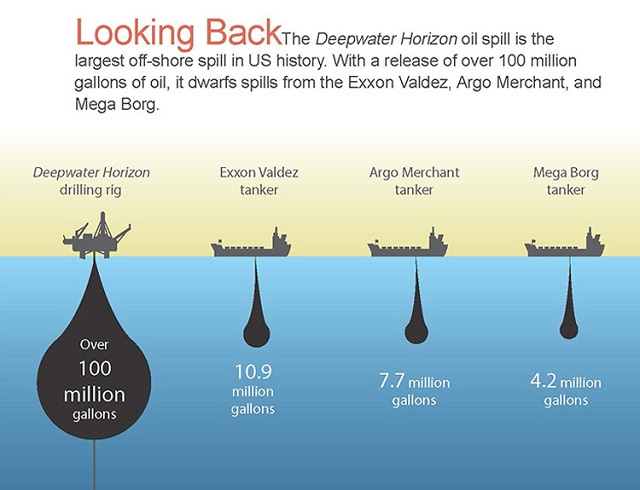Final Plan for Deepwater Horizon Restoration Released
The BP Natural Resource Damage Trustees have released a final comprehensive, integrated, ecosystem restoration plan for the Gulf of Mexico following the Deepwater Horizon oil spill.
The Trustees, consisting of the Gulf states and four federal agencies, prepared the plan on how to restore the environment over the next 15 years.
If adopted, the final plan would allocate up to $8.8 billion allocated for natural resource injuries under a proposed settlement with BP. The Trustees have proposed to accept this settlement, which would resolve BP’s liability for natural resource injuries stemming from the spill.
The trustees received more than 6,300 public comments on the draft plan and are now entering a 30-day waiting period, which will last until March 21, 2016, before making the final decision to adopt the plan.
The types of restoration in the plan will address a broad range of impacts at both regional and local scales. Together, these efforts will restore wildlife and habitat and increase recreational opportunities in the Gulf.
The five goals of the plan are to: 1) restore and conserve habitat; 2) restore water quality; 3) replenish and protect living coastal and marine resources; 4) provide and enhance recreational opportunities; and 5) provide for monitoring, adaptive management, and administrative oversight to support restoration implementation.
The restoration types are:
1. Wetlands, coastal, and nearshore habitats
2. Habitat projects on federally managed lands
3. Nutrient reduction
4. Water quality
5. Fish and water column invertebrates
6. Sturgeon
7. Submerged aquatic vegetation
8. Oysters
9. Sea turtles
10. Marine mammals
11. Birds
12. Mesophotic and benthic (lowlight and ocean floor) communities
13. Provide and enhance recreational opportunities
In finalizing this plan to address the ecosystem-level injuries caused by this spill, the Trustees analyzed both the potential environmental benefits and impacts of restoration alternatives.
The plan does not identify specific projects for each restoration type, but lays out a framework for developing future project-specific restoration plans. The public will have the opportunity to comment on these subsequent restoration plans.
The draft plan was released in October 2015 along with a consent decree settling all remaining claims against BP. The settlement is expected to be finalized in late spring.
 Ocean Concervancy Dissatisfied
Ocean Concervancy Dissatisfied
Although the final plan provides a few more details regarding the frequency of public meetings (which will happen annually), the Trustees have unfortunately neglected to respond meaningfully to a number of concerns regarding how they will plan for, administer and ultimately implement the expenditure of over $7 billion in funding for restoration, said Ocean Concervancy in a statement.
Ocean Conservancy and a number of others expressed grave concern regarding the Trustees' proposed governance structure, which outlines a distributed structure that essentially breaks one Trustee Council into eight different Councils that will operate with nothing but a verbal commitment to coordinate their efforts across the Gulf.
"While the underlying vision of comprehensive restoration is laudable, the Trustees' approach to implementation is largely disappointing, especially for those who are concerned with the magnitude of the impacts in the Gulf of Mexico itself," said Bethany Carl Kraft, Director of Ocean Conservancy's Gulf Restoration Program.
According to Carl Kraft, "Unfortunately the Trustees have chosen to largely ignore our plea to explicitly designate financial resources for restoration in the open ocean commensurate with the impacts. The disaster occurred in the deep waters of the Gulf, impacts continue to this day, and they are expected to continue for decades into the future. Comprehensive and effective restoration require that adequate resources are directed to the recovery of marine resources that Gulf communities depend on for their livelihoods.”
In the final plan, the Trustees have made a number of troubling decisions that jeopardize a comprehensive restoration approach, says Carl Kraft. First, they refused to cap administrative expenses for the federal trustees, which will come directly out of the open ocean fund. They also declined to reallocate previously funded lost recreational use projects that have nothing to do with marine resources. Finally, the Trustees have included new language potentially expanding the scope of projects that can be funded from the open ocean fund, jeopardizing full recovery of impacted marine resources.

that matters most
Get the latest maritime news delivered to your inbox daily.
"Full recovery requires investments across the spectrum of impacted resources, from the coast to the blue water. The extent of the impacts in the marine environment demand a dedicated source of funding that cannot be raided over the next 15 years,” said Carl Kraft. "The science behind the Trustees' summary of injuries and their proposed framework of restoration goals and types appear to be sound. We remain concerned that the biggest threat to the Trustees' success in achieving their own vision of a comprehensive, ecosystem-based approach to restoration are the Trustees themselves. Only time will tell if their decision to prioritize expedient decision-making will cost the Gulf dearly."
More details of the plan are available here.
